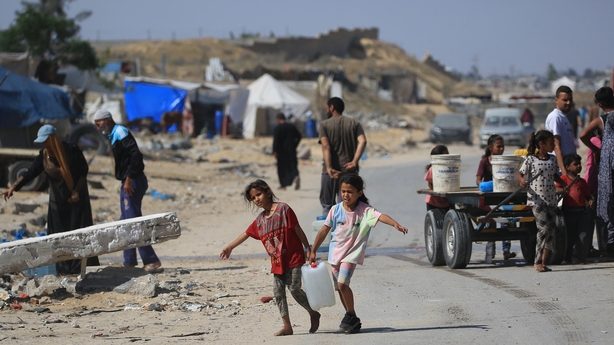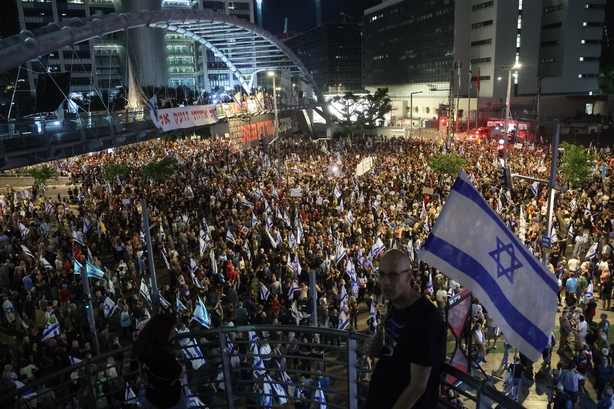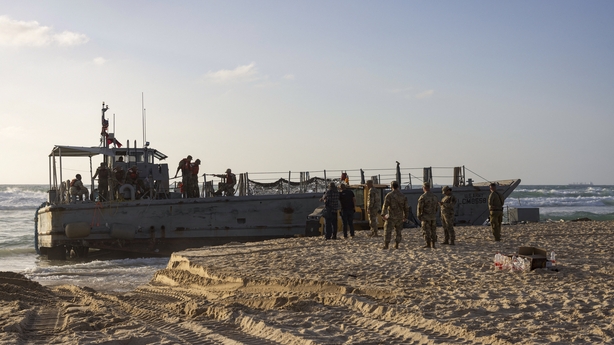Israeli warplanes and artillery has continued to strike Rafah, as the Israeli government dismissed an order by the top UN court to halt its military offensive in the southern Gaza city.
At the same time, renewed international efforts are under way aimed at securing a ceasefire in the war prompted by Palestinian militant group Hamas's 7 October attack on Israel.
An Israeli official said the government had an "intention" to restart stalled negotiations over the coming days.
In a case brought by South Africa alleging the Israeli military operation amounts to "genocide", the International Court of Justice ordered Israel to halt its Rafah offensive and demanded the release of hostages and the "unhindered provision" of humanitarian aid into Gaza.
The Hague-based ICJ, whose orders are legally binding but lack direct enforcement mechanisms, also instructed Israel to keep open the Rafah crossing between Egypt and Gaza, after Israel's seizure of the Palestinian side earlier this month effectively shut it.
Israel gave no indication it was preparing to change course in Rafah, insisting the court had got it wrong.
The ruling said Israel must "immediately halt its military offensive, and any other action in the Rafah governorate, which may inflict on the Palestinian group in Gaza conditions of life that could bring about its physical destruction in whole or in part".
But National Security Adviser Tzachi Hanegbi, in a joint statement with the foreign ministry, said: "Israel has not and will not carry out military operations in the Rafah area that create living conditions that could cause the destruction of the Palestinian civilian population, in whole or in part."
Hamas, the Iran-backed Islamist group that has ruled Gaza since 2007, welcomed the ruling but criticised the court's decision to exclude the rest of the Palestinian territory from its order.
'Nothing left here'

Israel carried out strikes throughout Gaza early today as fighting raged between the army and Palestinian militants.
Witnesses and AFP teams reported strikes or shelling in Rafah, the central city of Deir al-Balah, and Gaza City and Jabalia refugee camp in the north.
In Gaza City, an AFP photographer saw a grieving woman embracing one of several bodies, some of children, which were laid on the ground outside a clinic ahead of funerals.
They were killed in a strike on a school turned shelter in nearby Jabalia, a relative Saleh al-Aswad told AFP.
Umm Mohammad Al-Ashqa, a Palestinian woman from Gaza City displaced to Deir al-Balah by the war, told AFP she hoped "the court's decision will put pressure on Israel" to end the fighting, "because there is nothing left here".
Mohammed Saleh, also interviewed in Deir al-Balah, said Israel "considers itself above the law" and would not stop.
The ICJ ruling came days after the International Criminal Court prosecutor, Karim Khan, requested arrest warrants for Israeli and Hamas leaders for war crimes and crimes against humanity.
It also followed announcements by Ireland, Spain and Norway - that they would formally recognise the State of Palestine, a move two other European governments, Germany and Portugal, signalled yesterday they were not ready to join.
Spanish Foreign Minister José Manuel Albares demanded that Israel comply with the ICJ's ruling.
Paris meeting
The war broke out after Hamas's 7 October attack, which resulted in the deaths of more than 1,170 people, mostly civilians, according to an AFP tally based on Israeli official figures.
Militants also took 252 hostages, 121 of whom remain in Gaza, including 37 the army says are dead.
Israel's retaliatory offensive has killed at least 35,903 people in Gaza, mostly civilians, according to the Hamas-run territory's health ministry.
Diplomatic efforts have resumed to seek the first ceasefire in Gaza since a week-long truce and hostage release in November.
The Israeli official, requesting anonymity to discuss the negotiations, told AFP that "there is an intention to renew these talks this week, and there is an agreement".
An official with knowledge of the matter said a decision had been taken to resume the talks next week after the chief of Israel's Mossad intelligence agency met the head of the CIA and the prime minister of Qatar.

The source, who declined to be identified by name or nationality, said it had been decided that "in the coming week negotiations will open based on new proposals led by the mediators Egypt, Qatar and with active US involvement".
A Hamas official later denied Israeli media reports that the talks would resume in Cairo on Tuesday, telling Reuters: "There is no date".
Israeli Prime Minister Benjamin Netanyahu's government has come under increasing domestic pressure over the fate of the hostages, with demonstrators rallying again in Tel Aviv.
The official did not elaborate on the agreement, but Israeli media said intelligence chief David Barnea had agreed a new framework for negotiations in a meeting with US and Qatari mediators in Paris.
Speaking at the US military academy West Point, President Joe Biden said his administration was engaged in "urgent diplomacy to secure an immediate ceasefire that brings hostages home".
Mediator Egypt was continuing "its efforts to reactivate ceasefire negotiations", said Al-Qahera News, which has links with Egyptian intelligence.
Israeli forces entered Rafah in early May, defying global opposition and prompting an exodus of more than 800,000 people, according to UN figures.
Troops took over the Palestinian side of the Rafah border crossing, further slowing sporadic deliveries of aid for Gaza's 2.4 million people.
The White House said Egypt had agreed to temporarily send UN aid through another crossing, Kerem Shalom near Rafah, on Gaza's border with Israel.
The Al-Qahera report said Egypt was exerting "pressure on Israel to urgently let in the aid and fuel" stranded at the Rafah crossing and mentioned "temporary measures" to provide Gazans with humanitarian relief.
The UN has warned of famine in the territory, where most hospitals are no longer functioning.
The Kuwaiti Hospital in Rafah asked for fuel deliveries to ensure the "continued operation" of the only medical facility in the area still receiving patients.
Telecommunications operator Paltel said internet access in northern Gaza was disrupted today "due to the ongoing aggression".
Vessels run aground

Meanwhile, the US Central Command (CENTCOM) said four US Army vessels supporting the temporary pier built to deliver aid to Gaza have run aground in heavy seas and Israel is aiding a recovery effort.
"The vessels broke free from their moorings and two vessels are now anchored on the beach near the pier," the statement said.
"The third and fourth vessels are beached on the coast of Israel near Ashkelon," it added.
CENTCOM said that "no US personnel will enter Gaza".
"No injuries have been reported and the pier remains fully functional," it continued, adding that the Israel navy is assisting with recovering the vessels.
Israel has imposed a siege on Gaza that has hindered access to clean water, food, medicines and fuel for the territory's 2.4 million people.
US President Joe Biden had said in March the pier would be built to alleviate restrictions imposed by Israel on delivery by land to Gaza.
The UN World Food Programme "took possession of 97 trucks since the floating dock came into operation" on 17 May, Stéphane Dujarric, spokesman for UN chief Antonio Guterres, told reporters yesterday.
In the first few days of deliveries, people made off with the contents of some trucks heading to warehouses, but the situation has now stabilised, he said.
Italy pledges additional €35 million of aid for Palestinians
Italy will resume funding for the United Nations' Palestinian relief organisation UNRWA as part of a €35m aid package, Italian Foreign Minister Antonio Tajani said today.
Mr Tajani made the commitment during a meeting in Rome with Palestinian Prime Minister Mohammad Mustafa.
The Italian minister said €5m would go to UNRWA projects, with the remainder destined for its "Food for Gaza" initiative.
Italy was one of a number of countries to block aid for UNRWA following accusations by Israel that some of the agency's staff were involved in the 7 October Hamas attack on Israel that triggered the war.
"Italy has decided to resume financing specific projects destined to help Palestinian refugees but only after rigorous checks that guarantee that not one cent risks ending up supporting terrorism," Mr Tajani said.
UNRWA employs 13,000 people in Gaza, running the enclave's schools, its primary healthcare clinics and other social services, and distributing humanitarian aid.
In recent weeks, several countries have resumed funding the agency. Germany said last month it would resume co-operation with UNRWA following a report led by former French foreign minister Catherine Colonna into UNRWA's procedures for ensuring adherence to principles of neutrality.
Thousands of Israelis demand return of hostages
Thousands of Israelis rallied in Tel Aviv on Saturday to demand urgent government action to bring home hostages held in Gaza, after the bodies of several were retrieved.
Protesters observed a minute's silence in Tel Aviv's Hostages Square in honour of the captives whose bodies were recovered by Israeli troops this month, an AFP correspondent reported.
The army said on Friday that troops had retrieved the bodies of three hostages in an overnight operation in Jabalia in northern Gaza.
Another protest, calling for the resignation of Prime Minister Benjamin Netanyahu and an early election, was held nearby.
